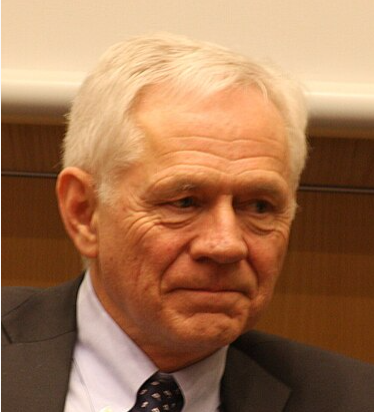victor norman

Victor D. Norman is a prominent Norwegian economist, academic, and former politician. His broad range of work spans multiple sectors, from academia to politics and business, making him a notable figure in Norway’s modern economic and political landscape. Known for his expertise in economics, his contributions have had a lasting impact on Norwegian policy and business strategy.Early Life and Education Born on July 18, 1946, in Risør, Norway, Victor Norman grew up with an early fascination for economics and societal structures. He pursued higher education in economics, earning a degree from Princeton University and later completing a Ph.D. in economics from the Massachusetts Institute of Technology (MIT). His educational background laid the foundation for a successful career in academia and beyond
Table of Contents
Introduction to Victor Norman
Victor D. Norman is a distinguished Norwegian economist, academic, and former politician known for his wide-ranging contributions to economics, public administration, and policy reform. Over the course of his multifaceted career, Norman has left a significant mark on Norway’s economic and political landscape. His expertise in international trade theory, combined with his experience in government administration, has earned him recognition both in academia and in the public sector.
Victor Norman is perhaps best known for his tenure as Norway’s Minister of Labour and Government Administration from 2001 to 2004, during which he implemented key reforms that modernized the country’s labor market and public services. His deep understanding of economics, coupled with his pragmatic approach to governance, has allowed him to influence a broad array of policies, making him a highly respected figure in Norwegian society.
Beyond his political career, Norman has also made substantial contributions to the academic field of economics. As a professor at the Norwegian School of Economics (NHH), he has influenced generations of students and economists, and his work in trade theory has been widely cited. Today, Victor Norman continues to be an influential voice in economic and political discourse, contributing to debates on public policy, business strategy, and international trade.
1. Victor Norman: An Overview
In this section, the article would provide a general introduction to Victor Norman, highlighting his career in both academia and politics. It would summarize his significant contributions to Norwegian society and introduce his role as an economist and public figure.
2. The Economist’s Early Career
This heading could dive deeper into Victor Norman’s early academic pursuits, focusing on his background in economics and his education at prestigious institutions like Princeton University and MIT. It would explore how these formative years shaped his career trajectory.
3. The Political Turn: From Academia to Public Office
This section would outline Norman’s shift from academia to politics, detailing how his expertise in economics enabled him to transition smoothly into his role as Norway’s Minister of Labour and Government Administration. His impact on labor reforms and public administration would be introduced here.
4. Key Contributions in Economic Theory
Under this heading, the article would explore Victor Norman’s contributions to economic theory, particularly his work in international trade. It would highlight some of his most influential academic papers and theories, explaining their significance.
5. A Leader Across Sectors
This heading would emphasize Norman’s ability to bridge academia, politics, and business. It would examine how his economic insights translated into effective leadership and decision-making in both government and business settings, showing his versatility as a leader.
Each of these sections provides a deeper understanding of Victor Norman’s career and his influence across various domains.
Early Life and Education
Victor D. Norman was born on July 18, 1946, in the small town of Risør, Norway. Raised in a modest family, Norman’s early life was shaped by a strong commitment to education and a curiosity about the world around him. His early interest in social structures and economics became evident during his schooling, where he excelled in mathematics and the social sciences. These subjects would later serve as the foundation for his academic and professional career.
After completing his early education in Norway, Norman pursued higher education abroad, studying economics at Princeton University, one of the world’s most prestigious institutions. There, he gained a deep understanding of economic theory and was exposed to influential economists who shaped his thinking. Following his undergraduate studies, Norman continued his academic journey, earning a Ph.D. in economics from the Massachusetts Institute of Technology (MIT), a globally recognized center for economic research.
At MIT, Norman worked with renowned economists and honed his skills in international trade theory, a field in which he would later make significant contributions. His time at these prestigious institutions not only gave him the technical knowledge needed for his future career but also broadened his perspective on global economic systems. His academic achievements and exposure to influential thinkers laid a strong foundation for his future roles in academia, politics, and the business world.
1. Victor Norman’s Childhood in Risør
This section would explore Victor Norman’s early life in Risør, Norway, providing insight into his upbringing, family background, and the experiences that shaped his early interest in economics. It could describe how growing up in a small town influenced his worldview and sparked his intellectual curiosity.
2. A Scholar Abroad: Studying at Princeton University
This heading would focus on Norman’s time at Princeton, where he studied economics and was mentored by some of the world’s leading economic thinkers. It would detail the academic environment at Princeton and how it influenced his future research and career trajectory.
3. Earning a Ph.D. from MIT: The Next Step
This section would discuss Norman’s decision to pursue a Ph.D. at MIT and the rigorous academic training he received there. It would highlight his specialization in international trade theory and how his doctoral research set the stage for his contributions to the field.
4. The Influence of Global Institutions on Norman’s Thinking
Under this heading, the article would examine how studying at globally recognized institutions like Princeton and MIT shaped Norman’s views on economics and governance. It could also describe how his time in the U.S. influenced his later work in both academia and politics in Norway.
5. Academic Achievements and Early Recognition
This section would highlight the key academic milestones Norman achieved during his education, including any scholarships, fellowships, or awards he may have received. It would also discuss the early recognition he garnered from his professors and peers for his work in economics.
Each of these headings and details would provide a comprehensive look at how Victor Norman’s early life and education played a crucial role in shaping his later achievements in economics, politics, and public service.
Career in Academia
Victor Norman’s career in academia is marked by his outstanding contributions to the field of economics, particularly in international trade theory. After completing his Ph.D. from MIT, Norman returned to Norway and began teaching at the Norwegian School of Economics (NHH). His reputation as a brilliant economist quickly grew, and he became a highly respected professor and researcher.
At NHH, Norman specialized in international trade, a complex field that studies how countries exchange goods and services. His research focused on the economic factors that influence trade and how government policies can affect global markets. Norman’s insights were groundbreaking and added valuable perspectives to the existing body of knowledge in economics.
In addition to his research, Norman was a dedicated teacher, inspiring many students with his deep understanding of economic principles. His teaching style, which combined theoretical insights with real-world applications, made him a favorite among students. He mentored several future economists, many of whom went on to become prominent figures in academia and the public sector.
Norman also collaborated with various institutions and contributed to international research projects, further expanding his influence in the field. His academic work was not limited to Norway but had global reach, with his papers being widely cited by economists worldwide.
Over the years, Norman published numerous academic papers and books, cementing his legacy as a thought leader in economics. His contributions were recognized by his peers, and he received several awards for his research and teaching. Even as he transitioned into politics, Norman maintained a close relationship with academia, continuing to engage in research and contributing to economic discussions.
1. Becoming a Professor at the Norwegian School of Economics (NHH)
This section would detail how Victor Norman joined NHH after completing his Ph.D. and became one of the most respected professors in the institution. It would explore his teaching methods, his impact on students, and how he shaped the economic curriculum at NHH.
2. Specialization in International Trade Theory
This heading would delve into Norman’s specialization in international trade theory. It would explain the key areas of his research, such as trade policies, market dynamics, and economic competition between nations. The section would highlight his most influential papers and how they contributed to the academic understanding of global trade.
3. Collaborations and Global Impact
This section would focus on Norman’s collaborative work with international economists and research institutions. It would highlight his participation in global economic discussions and how his research had an impact beyond Norway, influencing economic policy and academic thought worldwide.
4. Mentorship and Influence on Future Economists
Under this heading, the article would discuss Norman’s role as a mentor to many students who later became influential economists and policymakers. It would emphasize his ability to inspire and guide young minds, nurturing a new generation of thinkers in the field of economics.
5. Publications and Academic Recognition
This section would list some of Norman’s most significant academic publications, including books and peer-reviewed papers. It would also explore the awards and honors he received for his contributions to economics, underscoring the recognition he achieved throughout his academic career.
Each of these headings would provide a detailed examination of Victor Norman’s academic career, showcasing his influence as a professor, researcher, and mentor in the field of economics.
Political Involvement and Contributions
Victor Norman’s political career began when he entered public service as Norway’s Minister of Labour and Government Administration from 2001 to 2004. During his tenure, he was part of Prime Minister Kjell Magne Bondevik’s second cabinet, where he played a crucial role in reforming and modernizing Norway’s labor market and public administration.
Norman’s background as an economist gave him a unique perspective on labor policies, and he brought a pragmatic, data-driven approach to governance. One of his key contributions was promoting efficiency and modernization within the public sector. He implemented reforms aimed at streamlining government operations, reducing bureaucracy, and making public services more accessible and effective for citizens. These efforts helped improve the functionality and transparency of Norway’s public administration.
In the labor market, Norman focused on balancing labor rights with economic competitiveness. He supported reforms that encouraged flexibility in the labor market, making it easier for businesses to adapt to changing economic conditions while ensuring that workers’ rights were protected. His policies also promoted workforce participation and aimed to reduce unemployment, making a lasting impact on Norway’s economic stability.
Norman’s approach to governance was characterized by his ability to bridge the gap between academic theory and practical policy. He successfully applied his economic expertise to real-world problems, creating policies that fostered both economic growth and social welfare. Although his tenure as a minister was relatively short, the reforms he introduced had long-lasting effects on Norway’s labor policies and public sector efficiency.
His time in office earned him recognition as a capable and forward-thinking leader. Even after leaving his political role, Norman continued to be an influential voice in public debates, particularly on matters related to labor, public administration, and economic policy. His contributions to political life in Norway have left a legacy of modernization and efficiency in governance.
1. Entering Politics: A Shift from Academia to Public Service
This section would detail Victor Norman’s transition from an academic career to a political role. It would describe how his academic background prepared him for his role as Minister of Labour and Government Administration, highlighting the factors that led to his appointment in Prime Minister Kjell Magne Bondevik’s cabinet.
2. Reforming Norway’s Public Administration
This heading would focus on Norman’s efforts to modernize and reform Norway’s public administration. It would explain how he reduced bureaucracy and promoted efficiency, making the public sector more responsive to the needs of citizens. The section would also explore specific reforms and their long-term impact on Norwegian governance.
3. Labor Market Reforms: Balancing Flexibility and Worker Rights
In this section, the article would examine Norman’s contributions to labor market reform. It would highlight how he promoted labor market flexibility to help businesses adapt to economic changes while safeguarding workers’ rights. The section could also discuss how these reforms helped reduce unemployment and increase workforce participation in Norway.
4. A Pragmatic Approach to Governance
This section would explore Norman’s governance style, emphasizing his ability to apply economic theory to practical policy-making. It would detail how he used his expertise in economics to introduce data-driven policies that fostered both economic growth and social welfare, creating a balanced approach to governance.
5. Legacy and Lasting Impact on Norwegian Policy
Under this heading, the article would reflect on the long-term impact of Norman’s political contributions. It would discuss how his reforms in the labor market and public administration continued to shape Norwegian policy even after he left office. It would also examine how he remained an influential voice in public policy debates after his political career ended.
Each of these headings and sections provides a comprehensive look at Victor Norman’s political involvement and the lasting contributions he made to Norway’s governance and labor policies.
Influence on Norwegian Policy
Victor Norman’s influence on Norwegian policy extends far beyond his tenure as Minister of Labour and Government Administration. His unique combination of academic expertise and political experience has allowed him to shape a wide array of policies that have had a lasting impact on Norway’s economic and social structure. His contributions to labor reforms, public administration efficiency, and economic strategy have been crucial in modernizing various aspects of Norwegian governance.
One of Norman’s most significant contributions is his role in reforming the labor market. As an economist, he understood the importance of a flexible yet stable labor market for fostering economic growth and resilience. His policies aimed to reduce unemployment, increase workforce participation, and promote flexibility within the labor market while ensuring that workers’ rights remained protected. These reforms played a vital role in helping Norway navigate economic challenges and maintain a competitive edge in the global economy.
In addition to labor reforms, Norman’s work in modernizing Norway’s public administration is another key aspect of his influence on policy. He introduced changes that reduced bureaucracy, streamlined government operations, and made public services more accessible and efficient. His focus on increasing efficiency without sacrificing quality ensured that Norway’s public sector remained both effective and responsive to the needs of its citizens.
Norman’s academic background in economics also positioned him as a thought leader in shaping Norway’s broader economic policies. His research and experience allowed him to provide valuable insights into international trade, competition, and market regulation. He advocated for policies that promoted Norway’s economic interests on the global stage while maintaining a strong welfare state at home. His balanced approach to governance has been widely recognized as a model of combining social welfare with economic competitiveness.
Even after leaving his official political role, Norman continued to influence policy discussions through his writings, public speeches, and media appearances. His ability to bridge the gap between theoretical economics and practical policy has made him a trusted voice in debates on labor, economic reform, and public administration. To this day, his contributions continue to shape key aspects of Norwegian governance.
1. Labor Market Reforms: Ensuring Flexibility and Stability
This section would dive into Norman’s contributions to labor market reforms, detailing how his policies introduced flexibility for businesses while maintaining worker protections. It would explore how these reforms helped Norway maintain low unemployment rates and a competitive labor market in the face of economic challenges.
2. Public Administration Efficiency: Reducing Bureaucracy
Here, the focus would be on Norman’s reforms to modernize Norway’s public administration. It would discuss how he introduced measures to streamline government operations, cut down on unnecessary bureaucracy, and make public services more efficient and user-friendly for citizens.
3. Economic Strategy and Global Trade
This heading would explore how Norman’s academic expertise in international trade influenced Norway’s economic policies. It would highlight his views on global competition, market regulation, and the importance of trade for Norway’s economic growth. His role in shaping Norway’s approach to international trade negotiations and partnerships could be examined.
4. Balancing Social Welfare and Economic Growth
This section would focus on how Norman’s policies balanced economic growth with maintaining Norway’s strong social welfare state. It would highlight his belief in a welfare model that promotes social equality while fostering economic innovation and growth, making Norway an example of successful social capitalism.
5. Continued Influence on Policy Debates
Even after leaving office, Norman remained an influential figure in policy debates. This section would discuss how he continued to contribute to discussions on labor market reforms, economic policies, and public administration through his academic work, public speaking, and advisory roles.
Each of these sections would provide a comprehensive look at how Victor Norman has shaped Norwegian policy, both during his time in office and beyond, demonstrating his lasting impact on the country’s governance and economy.
Impact on the Business Sector
Victor Norman’s influence on Norway’s business sector is rooted in his deep understanding of economics and his ability to bridge the gap between academia, politics, and the private sector. As an economist, his research on international trade, competition, and market structures provided valuable insights that helped shape the business environment in Norway. His pragmatic approach to economic policy was aimed at creating a business climate that promoted innovation, competitiveness, and long-term growth while maintaining social responsibility.
One of Norman’s significant impacts on the business sector was his emphasis on labor market flexibility. During his time as Minister of Labour and Government Administration, he introduced reforms that allowed businesses to adapt more easily to changes in the global economy. By promoting policies that balanced the needs of employers with those of workers, Norman ensured that Norwegian companies remained competitive in an increasingly globalized world. This flexibility made it easier for businesses to hire and retain skilled workers, fostering an environment of growth and innovation.
Norman also contributed to the development of Norway’s public-private partnerships, encouraging collaboration between the government and businesses to improve public services and infrastructure. His belief in efficiency and modernization led to the adoption of business-like practices within the public sector, such as outsourcing certain services and streamlining operations. These changes not only improved the quality and efficiency of public services but also opened new opportunities for private companies to participate in delivering these services.
Moreover, Norman’s academic work on international trade had a direct impact on Norwegian companies engaged in global markets. His insights into trade policies and competition theory helped businesses navigate the complexities of international trade, allowing them to expand their operations and compete more effectively on a global scale. His influence on policy ensured that Norway maintained a favorable position in international trade negotiations, benefiting the country’s export-oriented industries.
Even after his formal political career ended, Norman continued to be a key figure in shaping business policies in Norway. He remained involved in advisory roles, providing guidance to both private companies and governmental bodies on economic and business-related matters. His contributions to the business sector have been instrumental in making Norway a competitive and stable economy in the global marketplace.
1. Labor Market Flexibility: Supporting Business Growth
This section would explore how Victor Norman’s reforms in the labor market created a more flexible environment for businesses to grow and adapt to changing economic conditions. It would highlight his policies that made it easier for businesses to hire, manage labor costs, and retain skilled workers, which ultimately enhanced competitiveness.
2. Public-Private Partnerships: A Collaborative Approach
Under this heading, the article would discuss how Norman promoted public-private partnerships, fostering collaboration between the government and businesses. It would detail how these partnerships helped improve public infrastructure and services, while also providing new opportunities for private sector growth.
3. Influence on International Trade Policies
This section would focus on Norman’s contributions to shaping trade policies that benefited Norwegian businesses. It would highlight how his academic work on international trade and competition helped Norwegian companies succeed in global markets, particularly in sectors like shipping, energy, and technology.
4. Modernizing the Public Sector: Opportunities for Business
This heading would focus on Norman’s efforts to modernize Norway’s public sector through business-like practices. It would explore how outsourcing and operational efficiency created new opportunities for private companies to collaborate with the government, particularly in delivering public services and infrastructure projects.
5. Advisory Roles and Continued Business Influence
Even after leaving political office, Norman continued to impact the business sector. This section would detail his work as an advisor to private companies and government agencies, highlighting how his economic expertise continued to shape business policies and strategies in Norway.
Each of these sections would demonstrate how Victor Norman’s economic knowledge and policy initiatives had a lasting and positive effect on the business sector in Norway, contributing to the country’s success in both domestic and international markets.
Victor Norman’s Legacy and Continued Influence
Victor Norman’s legacy is defined by his lasting contributions to economics, public administration, and political reform in Norway. As both an academic and a public servant, Norman’s work bridged the gap between theoretical economics and practical governance. His impact is felt across multiple sectors, including labor market reform, public administration modernization, and international trade. Long after his formal political and academic roles, Norman’s ideas continue to influence policy decisions and economic thought in Norway and beyond.
One of the cornerstones of Norman’s legacy is his contribution to modernizing Norway’s labor market. His reforms emphasized labor market flexibility, allowing businesses to adapt to economic changes while safeguarding worker rights. This balance between economic growth and social welfare remains a model for labor policies in Norway and has had a lasting influence on how the country navigates global economic shifts.
Norman’s influence on public administration also endures. His push for efficiency, transparency, and modernization in government operations helped shape a public sector that is both responsive and effective. The reforms he implemented to streamline bureaucracy and improve service delivery have had a lasting effect on how the Norwegian government operates today.
In addition to his role in shaping domestic policy, Norman’s academic work on international trade and economics continues to resonate globally. His contributions to trade theory and competition policy have been widely cited in academic literature and have informed economic policies worldwide. His ability to connect abstract economic concepts with real-world challenges has left a lasting mark on both academia and public policy.
Even after retiring from formal political and academic positions, Norman has remained a respected voice in public debates. He continues to contribute through advisory roles, public speaking, and written works, influencing contemporary discussions on labor, economics, and governance. His legacy is one of thoughtful leadership, combining academic rigor with practical solutions that have benefited Norway and its global standing.
1. A Lasting Impact on Labor Market Reform
This section would focus on how Victor Norman’s labor market reforms continue to shape Norway’s approach to balancing economic flexibility with worker protection. It would explore how his policies are still used as a reference for creating adaptive, competitive labor markets in today’s economy.
2. Public Administration Modernization: A Blueprint for Efficiency
Under this heading, the article would detail how Norman’s efforts to modernize and streamline Norway’s public administration have left a lasting legacy. It would examine how his reforms in reducing bureaucracy and improving service efficiency continue to influence governmental operations and public service delivery.
3. Global Contributions to Economics and Trade Theory
This section would explore Norman’s academic legacy, focusing on how his work in international trade and competition theory continues to influence economists and policymakers around the world. It would highlight key academic contributions and their relevance to current global trade policies.
4. Thought Leadership Beyond Politics
After leaving formal positions, Norman continued to influence public policy and economic thought through advisory roles and public speaking. This section would discuss his ongoing contributions to debates on labor market policies, economic reform, and public administration, showing that his influence persists even in retirement.
5. Legacy of Balanced Governance: Economic Growth and Social Welfare
Norman’s governance style, which emphasized a balance between economic competitiveness and social welfare, remains a key part of his legacy. This section would reflect on how his balanced approach to policy-making continues to serve as a model for modern governance in Norway and other welfare states.
Each of these sections would illustrate how Victor Norman’s legacy and continued influence extend across multiple domains, from labor and public administration to global economics, ensuring that his ideas and contributions remain relevant and impactful today.
Conclusion: A Multifaceted Leader
Victor Norman’s career reflects a rare combination of academic brilliance, political leadership, and practical policy implementation. His contributions to economics, public administration, and labor reforms have left a lasting impact on Norway, and his legacy continues to influence both national and international policies.
Norman’s ability to transition seamlessly between academia and politics demonstrates his multifaceted leadership. As an economist, he provided groundbreaking insights into international trade and competition theory, shaping global economic thought. In his political career, he brought academic rigor to his role as Norway’s Minister of Labour and Government Administration, implementing reforms that enhanced labor market flexibility and streamlined public services.
His legacy in modernizing Norway’s labor market is particularly noteworthy. By promoting labor flexibility while protecting workers’ rights, Norman ensured that Norway remained competitive in a globalized economy. His reforms in public administration, aimed at reducing bureaucracy and improving efficiency, are still felt in the way Norway’s government operates today. Additionally, his academic work continues to be a reference point for economists around the world, proving that his intellectual contributions have enduring value.
Even after his formal roles ended, Norman’s voice remained influential in public discourse, contributing to ongoing discussions about economic and labor policies. His ability to bridge theoretical knowledge with practical solutions allowed him to make a difference in both the academic world and the realm of public policy.
Victor Norman’s multifaceted leadership exemplifies how a deep understanding of economics, combined with practical governance, can lead to sustainable and balanced policy-making. His legacy is one of lasting influence, not only in Norway but on a global scale, where his ideas continue to shape economic and administrative frameworks.
1. Bridging Academia and Politics
This section would explore how Victor Norman successfully transitioned between being an economist and a politician, using his academic insights to inform and shape practical policies. It would highlight his unique ability to merge theory with practice, which is rare among leaders.
2. A Lasting Legacy in Labor Market Reform
Here, the article would recap Norman’s contributions to labor market reform, emphasizing how his policies helped modernize the Norwegian labor market and ensure its resilience in a global economy. This would serve as a key part of his legacy as both an academic and a politician.
3. Influencing Public Administration for Generations
This heading would focus on Norman’s role in streamlining and improving public administration in Norway. It would highlight how his reforms are still relevant today and continue to influence how public services are delivered efficiently.
4. Enduring Impact on Global Economic Thought
This section would look back at Norman’s contributions to economics, particularly in international trade and competition theory. It would emphasize how his research continues to influence global economic policies and academic discourse.
5. The Legacy of a Thoughtful Leader
Under this heading, the article would summarize Norman’s overall influence, reflecting on how his combination of academic expertise, political insight, and leadership qualities make him a multifaceted and enduring figure in both Norwegian and international contexts.
Each of these headings would bring together the various aspects of Victor Norman’s career, concluding with a comprehensive view of his legacy as a versatile and impactful leader.




